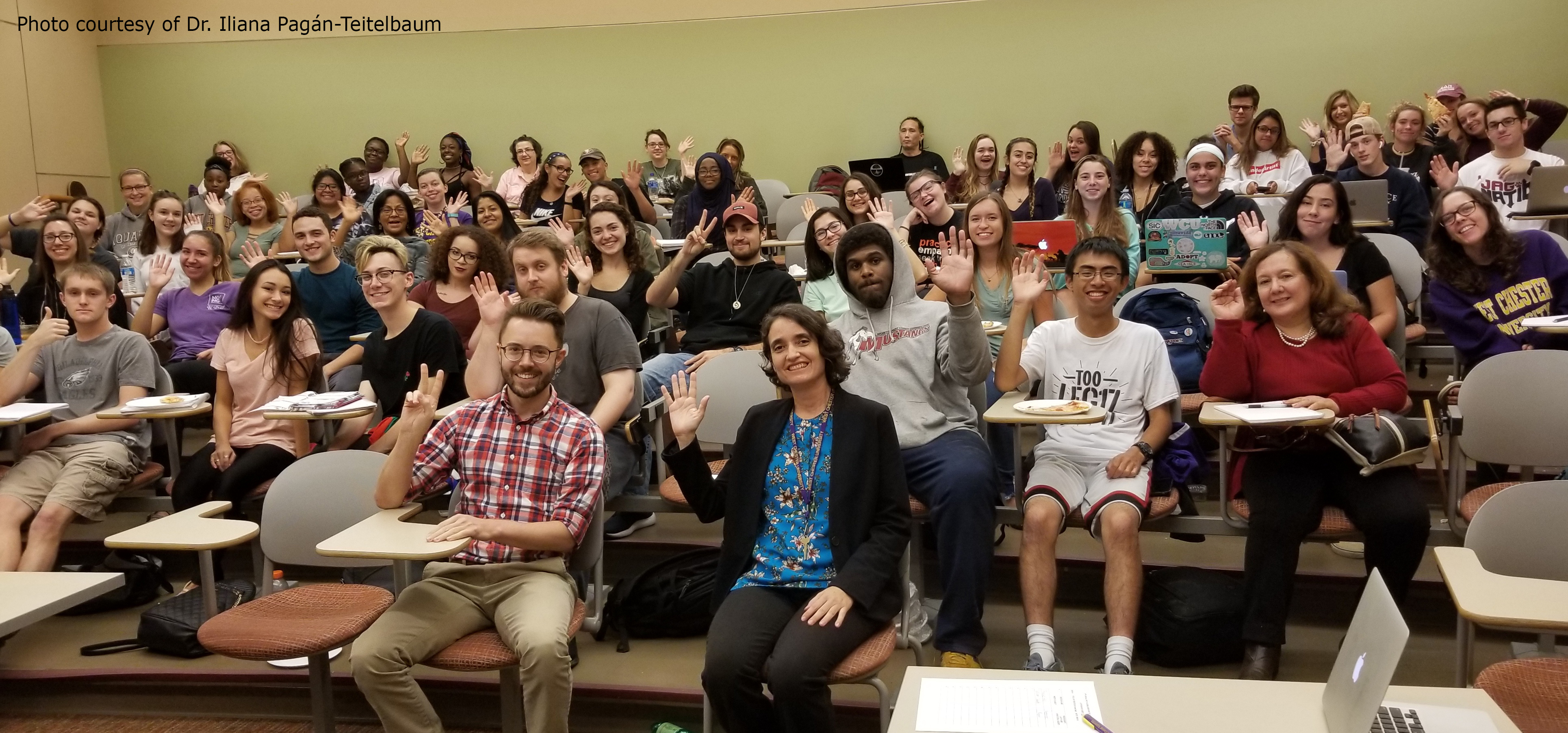On Monday, Oct. 1, 2018, West Chester University kicked off the first night of its fourth Annual Global Hispanic Film Festival. Organized by Dr. Iliana Pagán-Teitelbaum and Dr. Megan Saltzman, the five-week series of Hispanic movie screenings is free and open to the public, with a new film shown every Monday night of October at 7:30 p.m. in Mitchell Hall, room 102. The University will screen a different movie each week, demonstrating the various themes of youth, dance, satire, globalization and dystopia. All movies are shown in Spanish with English subtitles. The nights begin at 7:10 p.m. with free pizza, followed by a 10-minute background presentation by a professor at 7:20 p.m. to provide viewers a short history of the film. The movies then begin promptly at 7:30 p.m., with open discussion forums taking place after the end of the films.
Dr. Jason Bartles and Dr. Pagán-Teitelbaum, Assistant Professors of Spanish at West Chester University, introduced the Film Festival’s premier movie, “El Techo” (On the Roof). Written and directed by Patricia Ramos, the Cuban coming-of-age film celebrated the theme of youth, while giving a real portrayal of present-day Havana. As Ramos’s third and most popular film so far, “El Techo” follows the story of three young Cubans trying to figure out what to do with their lives. While introducing the film, Dr. Bartles acknowledged it is “not a Hollywood film,” since it paints a far more intimate picture of the lives of three friends. The entire film takes place on the rooftops of Havana over the span of three days. The story follows the lives of Anita, Vito and Yasmani. Anita is the film’s young female protagonist whose scenes often depict her as an emotional, short-tempered woman with food in her hands. Anita, who is pregnant, wonders for most of the film who has fathered her unborn child. Vito, the dreamer of the trio, spends his time tracing his Sicilian heritage, taking great pride in his hardworking grandfather’s immigration from Italy to Cuba. He waits for the day he can travel to Sicily himself. The third protagonist, Yasmani, dedicates himself to raising pigeons and training them to race—an activity that has recently become quite popular in Havana. The three characters discuss their hopes and dreams and decide to open a pizza restaurant together. This aspect of the film is very important because it represents the newfound freedom that Cubans now have. In the past, three kids could not simply come together and decide to start a business. Due to the fact Cuba has undergone a huge political and governmental transition in the past few years, its people are now allowed to open small businesses.
The three friends name their rooftop pizzeria “Sicilia Valdés,” a wordplay on the famous 1839 Cuban novel “Cecilia Valdés” by Cirilo Villaverde. Their small business starts slow but steadily gains traction. Anita continuously deals with the struggles of pregnancy, Yasmani keeps up with the training of his pigeons and Vito meets a customer from Sicily at their pizzeria, making him even more eager to visit the place from which his ancestors came. The movie skips ahead to one month later, showing Anita and Yasmani happily together in a romantic relationship. The two look at pictures on Anita’s phone of an ecstatic Vito in Sicily, visiting the customer who he originally met at Sicilia Valdés. The film ends with Anita and Yasmani discussing the demise of their pizza business and contemplating what they should do next.
After the film, attendees were encouraged to ask questions and share their thoughts. Caitlyn Handlin, a third-year Spanish and Anthropology dual major, called “El Techo” “a short movie without a lot of jam-packed drama, but enough to show an issue that’s really important in Cuba.” When asked why these films are so important, and what viewers can hope to take away from watching them, Dr. Pagán-Teitelbaum answered, “There are stereotypes about Latinos and Hispanics, but there is so much diversity around Spanish. We are opening up people’s minds to characters with whom kids can identify and making global connections that go beyond Hollywood’s portrayal of Hispanics. By hosting the Global Hispanic Film Festival, we are helping to overcome racism and are bringing people together through culture.”
Molly Dale is a second-year student majoring in Spanish with a minor in French. SW850037@wcupa.edu.

